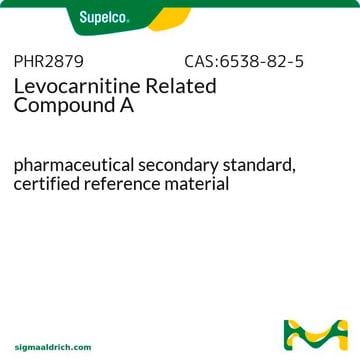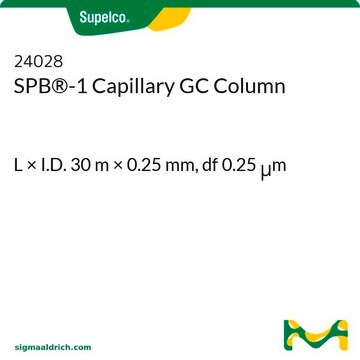L0399905
Levocarnitine impurity A
European Pharmacopoeia (EP) Reference Standard
Synonym(s):
(E/Z)-4-(Trimethylammonio)but-2-enoate
Sign Into View Organizational & Contract Pricing
All Photos(1)
About This Item
Empirical Formula (Hill Notation):
C7H13NO2
CAS Number:
Molecular Weight:
143.18
UNSPSC Code:
41116107
NACRES:
NA.24
Recommended Products
grade
pharmaceutical primary standard
API family
levocarnitine
manufacturer/tradename
EDQM
application(s)
pharmaceutical (small molecule)
format
neat
InChI
1S/C7H13NO2/c1-8(2,3)6-4-5-7(9)10/h4-5H,6H2,1-3H3/b5-4+
InChI key
GUYHPGUANSLONG-SNAWJCMRSA-N
General description
This product is provided as delivered and specified by the issuing Pharmacopoeia. All information provided in support of this product, including SDS and any product information leaflets have been developed and issued under the Authority of the Issuing Pharmacopoeia. For further information and support please go to the website of the issuing Pharmacopoeia.
Application
Levocarnitine impurity A EP Reference standard, intended for use in laboratory tests only as specifically prescribed in the European Pharmacopoeia.
Packaging
The product is delivered as supplied by the issuing Pharmacopoeia. For the current unit quantity, please visit the EDQM reference substance catalogue.
Other Notes
Sales restrictions may apply.
related product
Product No.
Description
Pricing
Signal Word
Warning
Hazard Statements
Precautionary Statements
Hazard Classifications
Eye Irrit. 2
Storage Class Code
11 - Combustible Solids
WGK
WGK 3
Flash Point(F)
Not applicable
Flash Point(C)
Not applicable
Choose from one of the most recent versions:
Certificates of Analysis (COA)
Lot/Batch Number
Sorry, we don't have COAs for this product available online at this time.
If you need assistance, please contact Customer Support.
Already Own This Product?
Find documentation for the products that you have recently purchased in the Document Library.
M Cánovas et al.
Metabolic engineering, 8(6), 603-618 (2006-08-15)
The aim of this work was to understand the steps controlling the biotransformation of trimethylammonium compounds into L(-)-carnitine by Escherichia coli. The high-cell density reactor steady-state levels of carbon source (glycerol), biotransformation substrate (crotonobetaine), acetate (anaerobiosis product) and fumarate (as
T Elssner et al.
Biochemistry, 40(37), 11140-11148 (2001-09-12)
Two proteins (CaiB and CaiD) were found to catalyze the reversible biotransformation of crotonobetaine to L-carnitine in Escherichia coli in the presence of a cosubstrate (e.g., gamma-butyrobetainyl-CoA or crotonobetainyl-CoA). CaiB (45 kDa) and CaiD (27 kDa) were purified in two
H Jung et al.
Journal of basic microbiology, 30(7), 507-514 (1990-01-01)
The uptake of L-carnitine by Escherichia coli 044 K74 which is able to metabolize L-carnitine to gamma-butyrobetaine under anaerobic conditions was studied. The uptake system of E. coli was induced in the presence of L-carnitine or crotonobetaine. The optimum influx
M Cánovas et al.
Biotechnology and bioengineering, 84(6), 686-699 (2003-11-05)
The aim of this work was to understand the steps controlling the process of biotransformation of trimethylamonium compounds into L(-)-carnitine by Escherichia coli and the link between the central carbon or primary and the secondary metabolism expressed. Thus, the enzyme
J M Obón et al.
Applied microbiology and biotechnology, 51(6), 760-764 (1999-07-28)
The use of a biological procedure for L-carnitine production as an alternative to chemical methods must be accompanied by an efficient and highly productive reaction system. Continuous L-carnitine production from crotonobetaine was studied in a cell-recycle reactor with Escherichia coli
Our team of scientists has experience in all areas of research including Life Science, Material Science, Chemical Synthesis, Chromatography, Analytical and many others.
Contact Technical Service







